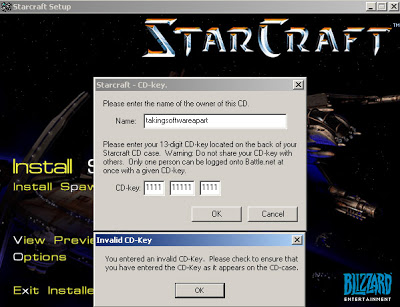
- #Use an old starcraft cd key to authenticate a newer version how to
- #Use an old starcraft cd key to authenticate a newer version verification
- #Use an old starcraft cd key to authenticate a newer version windows
ISteamUser::GetAuthSessionTicket must be called for every client in the mulitplayer session who requests a ticket.

When the multiplayer session terminates:.
#Use an old starcraft cd key to authenticate a newer version verification
The result of this verification will be returned in a ISteamUser::ValidateAuthTicketResponse_t callback. If the ticket is valid, then ISteamUser::BeginAuthSession will forward the ticket to then the Steam backend to verify that the ticket has not been reused and was issued by the account owner of client A.
#Use an old starcraft cd key to authenticate a newer version how to
P2P or Game Servers Session Tickets User AuthenticationThe following steps detail how to use Session Tickets to verify a user's identity between the user's game client (client A) and another client or game server (client B): More details on the Web API can be found here. The API also contains protected methods that require authentication and are intended to be accessed from trusted back-end applications. The API contains public methods that can be accessed from any application capable of making an HTTP request, such as game client or server. NOTE: These keys must be stored securely, and must not be distributed within your application in any way! Steamworks Web APISteam exposes an HTTP based Web API which can be used to access many Steamworks features. In order to access this section of Steamworks, a user must have the "Manage Signing" permission for the relevant Application. This key will be associated with your title's AppID and any downloadable content for that title. You can do this by navigating to Edit Steamworks Settings for your application and selecting 'SDK Auth' from the 'Security' drop-down.
#Use an old starcraft cd key to authenticate a newer version windows
The Steamworks SDK includes 32-bit and 64-bit versions of this library for Windows and Linux under the public/steam/lib directory.īefore using Encrypted Application Tickets, you must generate a private key for each title. Instead, a C++ library and a private, symmetric key are used by the secure server to verify the ticket. Unlike Session Tickets, verifying Encrypted Application Tickets does not require that the secure server can make HTTPS requests. Encrypted Application TicketsEncrypted Application Tickets can be used to verify a user's identity between a game client and a secure, backend server. Requires that the secure server can make HTTPS requests to. Session Tickets can also be used to verify a user's identity between a game client and a secure, backend server using the Steamworks Web API. These tickets can also be used to verify ownership of the current game and related downloadable content, and determine if the user has been VAC-banned (See Valve Anti-Cheat (VAC) and Game Bans). APIs covered in this document Session TicketsSession Tickets are signed tickets that can be used to verify a user's identity between the user's game client and any number of other game clients (such as in a peer-to-peer multiplayer session) or to a listen/dedicated game server (using the ISteamGameServer API). The following authentication methods can be used to securely verify a user's Steam ID. You can retrieve the current user's SteamID by calling ISteamUser::GetSteamID and then retrieve the 64-bit ID by calling CSteamID.ConvertToUint64() on the returned value. In the Steamworks C++ APIs, a user's SteamID is contained within a CSteamID object. Identifying a user within SteamEvery Steam user can be uniquely identified by a 64-bit numeric ID, known as the user's Steam ID.

Session Tickets and the Steamworks Web API.

Between a game client and a backend server using:.Between a game client and other clients (P2P) or game servers using Session Tickets.The following document describes each of these authentication methods used in the following scenarios: OverviewSteamworks exposes multiple methods for authenticating a Steam user's identity and verifying ownership of an application.


 0 kommentar(er)
0 kommentar(er)
